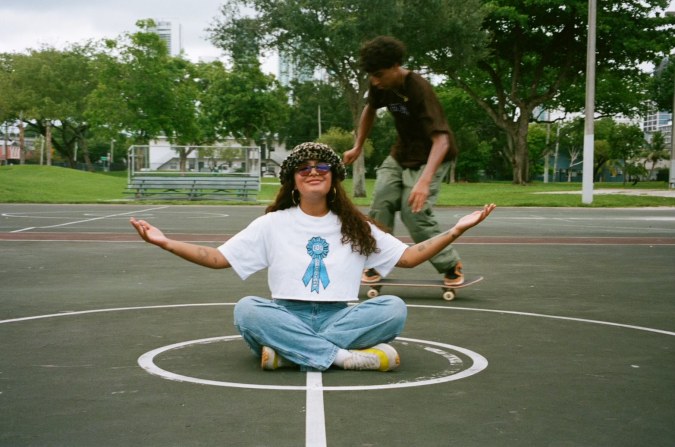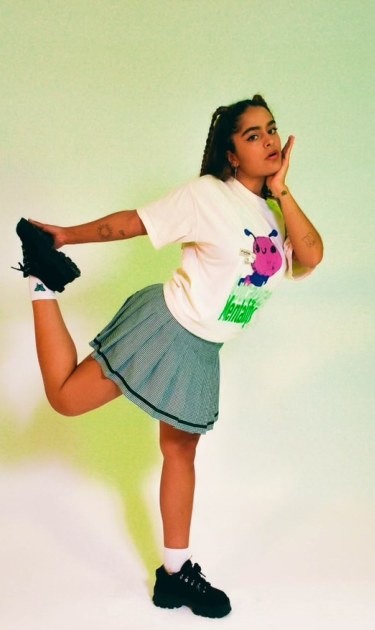Over a Zoom call, riela reveals that she never quite intended to release her last EP, Tranquila y Tropical. The Miami singer-songwriter tells Remezcla that she stopped creating any new material for a while after graduating from the Berklee College of Music in Boston, but had an epiphany of sorts along the way.
“I went into interning and working in music, but it kind of came to a point where I thought, ‘I love the people I work for, and I love all this stuff… But why shouldn’t I be working on these things for myself?’” she says. “‘I can do it. I just have to be confident.’ Even though I’m just starting… This point where I’m at is a really good place to be.”
riela is the daughter of Cuban and Panamanian immigrants. She notes that growing up in Miami often meant being at the crossroads of different sonic atmospheres, like how you could go from overhearing beachgoers blasting El General on their stereo, to buskers strumming away on nylon-string guitars during walks down Calle Ocho with your grandma, all in the same day. She talks about getting to hear pan flutes during her childhood visits to Panama with the same enthusiasm as her love for Usher’s vocal runs in his cover of Phil Collins’ “You’ll Be In My Heart.” She has been singing since about the age of six or seven, plays guitar, and dabbled in piano for a while, but mentions that her time at Berklee (along with working under the guidance of music educators like Nichelle Mungo) led her to really honing in on her vocal technique.
“I just was working on singing really well, rather than trying to perfect guitar or piano,” she says.

In early 2020, riela suddenly found herself working fewer hours due to the pandemic, but she directed her attention towards a set of songs that would eventually become Tranquila y Tropical, a fusion of in-your-head-for-days alternative R&B and perreo-worthy hooks, and the first installment in a tarot-inspired EP trilogy (“That one is based on The Fool,” she adds). One of its first singles, “mala maña,” landed her a shoutout on the SoundCloud blog, Repost Rewind, which she says gave her the boost to keep it going.

riela’s sound makes her a misfit of sorts. It’s contemporary in the way she swiftly jumps back and forth between English and Spanish in the same line over thumping, bass drum-heavy trap beats, but also retreats to the flirty and smooth dreaminess of ‘90s R&B. She makes music you can sway to, silky vocals and all, but her lyrics can also mirror the self-assuredness of your favorite rapper.
Her latest song, “lyu2” (short for “Like You Used To”) features fellow Miami native and singer marcos g, and is the first single off of her next EP, llorar y perrear, which is slated to drop in early 2022. “lyu2” mashes up her dembow-driven and syrupy pop influences, and is the bittersweet soundtrack to those late summer nights lost in deep rumination because you know your relationship has taken a turn — the texts or calls from your person have become more and more infrequent and you can’t help but wonder if something went wrong, or if it’s just all in your head.

“I hadn’t heard from this person after talking to them 24/7,” riela states. “I [told] marcos all about it… It was super fresh, maybe two days after? We wrote that song the night we met. I idealize a lot, and it’s hard to be honest with yourself when you might be at fault, like, ‘was I clingy? Was I too this or that?’”
Regardless of whatever it may be, “lyu2” gives voice to that far too recognizable feeling where you’re just holding out for some kind of sign: “No quiero jugar/ solamente quiero estar/ a tu lado sin pensar/ que te voy a molestar… You don’t hit me up like you used to/ started playing games I’m not used to.”
While the release of llorar y perrear is still some months out, riela has hinted at what listeners can anticipate this time around—some rock and pop touches, some acoustic material, trap and reggaeton melodies, plus some more experimental sounds.

“I’m sure I’ve been [categorized] as ‘Latin’ because I have elements of Latin music, but there’s more to that… I think over time, things are going to change more and more. I hope I can contribute to being part of that change.”




